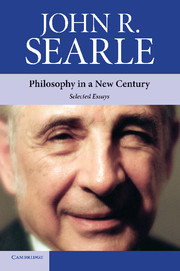Book contents
- Frontmatter
- Contents
- Original place of publication of the essays
- Introduction
- 1 Philosophy in a new century
- 2 Social ontology: some basic principles (with a new addendum by the author)
- 3 The Turing Test: fifty-five years later
- 4 Twenty-one years in the Chinese Room
- 5 Is the brain a digital computer?
- 6 The phenomenological illusion
- 7 The self as a problem in philosophy and neurobiology
- 8 Why I am not a property dualist
- 9 Fact and value, “is” and “ought,” and reasons for action
- 10 The unity of the proposition
- Name index
- Subject index
- References
6 - The phenomenological illusion
Published online by Cambridge University Press: 05 June 2012
- Frontmatter
- Contents
- Original place of publication of the essays
- Introduction
- 1 Philosophy in a new century
- 2 Social ontology: some basic principles (with a new addendum by the author)
- 3 The Turing Test: fifty-five years later
- 4 Twenty-one years in the Chinese Room
- 5 Is the brain a digital computer?
- 6 The phenomenological illusion
- 7 The self as a problem in philosophy and neurobiology
- 8 Why I am not a property dualist
- 9 Fact and value, “is” and “ought,” and reasons for action
- 10 The unity of the proposition
- Name index
- Subject index
- References
Summary
I was asked to lecture at the Wittgenstein conference in Kirchberg in 2004 on the subject of phenomenology. This request surprised me somewhat because I am certainly not a scholar on the writings of phenomenological philosophers, nor have I done much work that I consider phenomenological in any strict sense. However, I was glad to accept the invitation because I have had some peculiar experiences with phenomenology. Also, it seemed worth discussing this issue at a Wittgenstein conference because the recent revival of interest in consciousness among analytic philosophers has lead to a renewed interest in phenomenological authors, since, of course, phenomenology is in large part concerned with consciousness.
I presented a lecture on the subject, the general thesis of which was that there is a type of idealism present in some of the leading phenomenologists, specifically later Husserl, Heidegger, and Merleau-Ponty. It is idealism of a specific kind that I tried to define semantically – somewhat different from the traditional idealism of Berkeley, which is defined metaphysically, but close enough in family resemblance to the traditional conceptions of idealism to merit the term. The definition I used was this: A view is idealist in this semantic sense if it does not allow for irreducibly de re references to objects. All references to objects are interpreted as being within the scope of some phenomenological operator, such as Dasein or transcendental consciousness.
- Type
- Chapter
- Information
- Philosophy in a New CenturySelected Essays, pp. 107 - 136Publisher: Cambridge University PressPrint publication year: 2008
References
- 2
- Cited by



